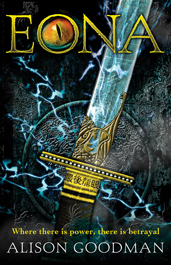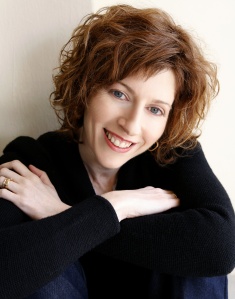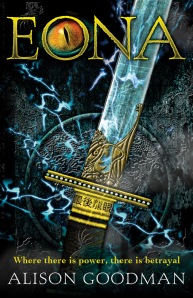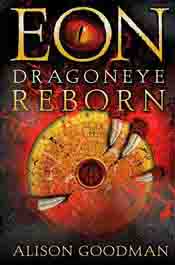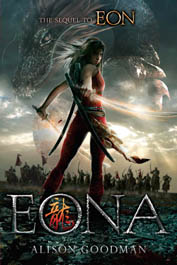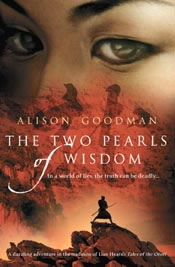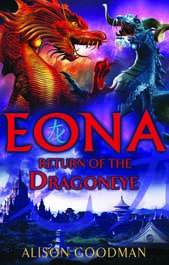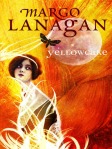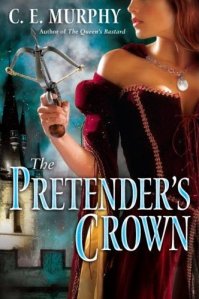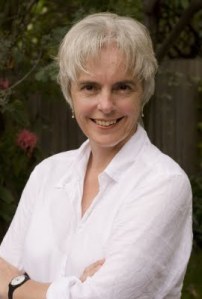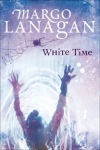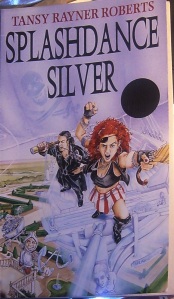As the next of my series featuring fantastic female fantasy authors (see disclaimer) I’ve invited the amazingly prolific and talented Juliet McKenna to drop by.
Watch out for the give-away question at the end of the interview.
Q: Wow, Juliet, looking at your list of published books takes my breath away. Tell me, do you sleep 3 hours a night?
Well, I have been doing this for a while now. My first novel, The Thief’s Gamble came out in January 1999, so I’ve written a book a year since then. I’m also lucky enough to write full time, as far as any wife and mother can do that. So I work from around 8.30 in the morning when my husband and teenage sons have left for work, college and school, until about 5 in the afternoon.
That’s writing the current book in progress along with doing fun things like this, blogging, reviewing, getting involved in conventions and other events and the much less exciting but equally necessary stuff like the accounts and other administrivia.
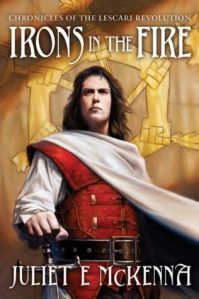 Q: You have five series out now with a 3 – 5 books in each series. There’s The Tales of Einarinn, The Aldabreshin Compass, The Lescari Revolution, and your news series, The Hadrumal Crisis. You have an invented world and where you have set stories in different places (and at different times?), with some characters crossing over into different series. Tell me, do you have a huge map on the wall with a flow chart of events and timelines for different families and kingdoms? How do you keep it all straight in your head?
Q: You have five series out now with a 3 – 5 books in each series. There’s The Tales of Einarinn, The Aldabreshin Compass, The Lescari Revolution, and your news series, The Hadrumal Crisis. You have an invented world and where you have set stories in different places (and at different times?), with some characters crossing over into different series. Tell me, do you have a huge map on the wall with a flow chart of events and timelines for different families and kingdoms? How do you keep it all straight in your head?
I have a lovely big map. One of the smartest moves I ever made, in hindsight, was marrying a design engineer who trained as a draughtsman. He drew that map for me and it’s fantastic. I used to keep a card index with details of every character noted down but that got harder and harder to keep up to date at the same time as computers made searching for individual characters in the text of a book so much easier. So that’s how I keep track of the details now.
That said, preparing for this new series, I did have to go back and re-read my first nine books, making notes as I went, since I’m picking up a lot of threads from those earlier tales. I have always drawn up timelines for each book, with notes on what each character’s doing and where they are. I’m one of those writers who does a lot of planning ahead before I ever type ‘Chapter One’. Every book has its own working note book and so I can also refer back to those when whatever I’m currently writing draws on what’s happened before.
On the other hand, I work very hard to make sure that each series is a fresh start, so that readers don’t have to go all the way through my backlist for the new story to make sense. That does lighten the burden of what’s gone before for me as a writer. I only have to include essential back story, in the same way as any author creating rounded, realistic characters does with any book.
 Q: Reading the information on your web site, your books come across as very down to earth stories about real people, set in a world where magic happens to be normal. Where … ‘there are developments in science and technology, philosophy and literature, quite independently of whatever it is that has wizards and princes running round in circles?’ Would describe yourself as a very grounded person, who just happens to have an imagination that won’t let her sleep?
Q: Reading the information on your web site, your books come across as very down to earth stories about real people, set in a world where magic happens to be normal. Where … ‘there are developments in science and technology, philosophy and literature, quite independently of whatever it is that has wizards and princes running round in circles?’ Would describe yourself as a very grounded person, who just happens to have an imagination that won’t let her sleep?
Words that often come up when people are describing me are ‘practical’ and ‘organised’ and yes, I imagine ‘grounded’ is in there too. That said, I think what I’ve always read and enjoyed has more influence on what I write than my personal character. I’ve always loved books that feel ‘real’ and I’ve always read right across the speculative genre and on into folklore and myth and then onwards into history.
They’re all colours in the same spectrum as far as I am concerned, and how can anyone read this wonderful stuff without their own imagination catching light? I’ve made up stories for as long as I can remember. I was one of those kids who could spend a whole afternoon spinning some fantastic yarn with a couple of toy animals, some building bricks and a cardboard box.
As to the depth and breadth of the worlds I create now, knowing so much history, I really cannot be doing with fantasy worlds where nothing changes in a thousand years (unless that’s part of the point the writer is making). I think how much change my grandmother saw in her 95 years!
Q: In an interview on SFFWorld, you mention that you do aikido. (This is one of the martial arts I studied for 5 years. I found it helped me when writing fight scenes). Do you do other martial arts and did you find that they help you give verisimilitude to your fight scenes?
I have nearly thirty years of aikido under my (black) belt now, including sword and staff fighting techniques, and yes, that’s a fantastic help when I’m writing fight scenes. I don’t do any other martial arts but I do swap notes with those studying other disciplines. Shotokan Karate blackbelt and author John Meaney and I did a hands-on panel on fight scenes at a recent convention and that was a fascinating exercise in compare and contrast.
I also did some Live Action Role Playing as a student and that’s also very useful. Table top gaming just isn’t the same. Get out in some woods at night for real and you really won’t have a clue what cunning plan the wizard ten feet behind you is hatching when all you’re looking at is the orc who’s trying to cut your head off!
That said, as an author, I have to be aware of readers’ expectations, particularly the way those have been shaped by what they see on film and TV, where fights are long, drawn-out, full of ups and downs, will our hero win or won’t he? Whereas real fights, when at least one person knows what they’re doing, tend to be very short and to the point. Also, when you’re watching a fight, it’s clear who’s doing what. Describing a fight so the reader can visualize it can be tricky. So, as with any other aspect of writing, crafting a fight scene that’s both realistic and rewarding for the reader is a challenge. But hey, if it was easy, it wouldn’t be nearly so much fun.
 Q: You are one of the founding members of The Write Fantastic , (TWF), an organisation established in 2004 to promote the fantasy genre. On your TWF site, you say: ‘Nowadays … Bestsellers thrive, while writers seen as ‘mid-list’, and those in genre fiction, suffer. Browsing used to be the route by which such authors picked up new readers. But now people popping into a bookshop ‘for something to read’ get no further than the 3 for 2 deals. So authors face a choice between grousing into their beer or looking for alternate ways to contact potential readers and bring them in past the discount tables and the bestseller charts.’ Do you think TWF has helped fantasy writers connect with new readers?
Q: You are one of the founding members of The Write Fantastic , (TWF), an organisation established in 2004 to promote the fantasy genre. On your TWF site, you say: ‘Nowadays … Bestsellers thrive, while writers seen as ‘mid-list’, and those in genre fiction, suffer. Browsing used to be the route by which such authors picked up new readers. But now people popping into a bookshop ‘for something to read’ get no further than the 3 for 2 deals. So authors face a choice between grousing into their beer or looking for alternate ways to contact potential readers and bring them in past the discount tables and the bestseller charts.’ Do you think TWF has helped fantasy writers connect with new readers?
Definitely. The feedback we get tells us that time and again. The publishing world, from that first idea in your head to the finished book on the shelf in the shop, has changed enormously in the past ten years. What hasn’t changed, and what never seems to change though, is what really sells books is word of mouth recommendation.
Readers are always eager to hear about new books and these days, there are so many books that it can be a challenge to keep up to date with the new voices, never mind hearing about other people’s established favourites which you might not have tried. Hearing writers talk, about what they’re writing and what they’re reading is always a good way to find out if something’s likely to be on your particular wavelength.
Q: I see that TWF has successfully applied for grants. I’m thinking that is what my ROR group should do. One of the things that holds us back here in Australia is that the literary festivals expect to be contacted by the publishers who want to promote their authors. If an author contacts a literary festival, more often than not, they ignore the author. I’m guessing you haven’t had this problem in the UK?
 Well, we have had success in the past… That kind of grant money dried up a few years ago. Then last year, as soon as the current government was elected here in the UK, the library funding for author visits was drastically cut back, so we lost a lot of those events. This year, so far, I’m hearing of literary festivals being cancelled or put on hiatus, so we’re looking at alternatives for TWF gigs, not least running a day event or two ourselves.
Well, we have had success in the past… That kind of grant money dried up a few years ago. Then last year, as soon as the current government was elected here in the UK, the library funding for author visits was drastically cut back, so we lost a lot of those events. This year, so far, I’m hearing of literary festivals being cancelled or put on hiatus, so we’re looking at alternatives for TWF gigs, not least running a day event or two ourselves.
Literary festivals vary enormously. The really big ones, sponsored by our national newspapers, certainly aren’t much interested in dealing with anyone outside the best-seller lists, whose publisher will be paying to promote them, and where the author is expected to turn up and do their thing and be grateful for ‘the prestige’. It’s actually the smaller, more local events that are open to approaches from groups like TWF and will often work harder to pay writers for their time.
Q: I was prompted to start this series of interviews because there seems to be a perception in the US and the UK that fantasy is a bit of a boy’s club. Do you think there’s a difference in the way males and females write fantasy?
This idea that fantasy is for men, written by men, does persist and it baffles me for several reasons. I mean, don’t people look at the shelves? There are so many women writing superb fantasy these days, in the UK, the US and elsewhere. Perhaps it’s another knock-on effect of those front-of-store promotions. The mega-sellers of late have been written by men and so they have much greater visibility, certainly for people who don’t know much about our genre. I’m not sure what we women can do beyond write the best books we can and hope they reach that readership tipping point to get us to the front of the bookstore. But of course, we are already writing the best books we can…
Do we write differently to the men? That’s hard to say. I’m sure for any generalisation that I might make, someone will be able to point to a book where that simply doesn’t apply. For instance if I said, women writers focus more on the emotional responses of female characters with a higher profile overall within the story. Or if I said, male writers get far more down and dirty with the vicious and brutal.
I really do think it’s a problem of perception rather than reality and we all need to challenge it if it’s ever going to change.
Q: Following on from that, does the gender of the writer change your expectations when you pick up their book?
 No, it really doesn’t. What grabs me is the back cover copy and then the first page. It’s all about the story and the characters for me.
No, it really doesn’t. What grabs me is the back cover copy and then the first page. It’s all about the story and the characters for me.
Q: And here’s the fun question. If you could book a trip on a time machine, where and when would you go, and why?
Ancient Rome, in the last days of the Republic. I studied this period at university and actually being there, seeing what really happened would be fantastic. Of course, I would need some kind of access all areas pass or Doctor Who’s psychic paper so I didn’t just end up wandering round the Forum. Though that would be pretty cool as well.
Or… a hundred years into the future, where I would want to spend a week just soaking up the atmosphere, the news media, the day to day life, to see how far we had come as humanity, and what hadn’t really changed, for better or for worse.
Find Juliet’s blog here.
For a video interview of Juliet McKenna see here.
Hear the Ghost in the Machine Podcast with Juliet McKenna.
Juliet on Facebook
Juliet is happy to give away a copy of one of her books, depending on which one you need to fill the gap in your collection. Here’s the give-away question:
Every fantasy fan I know is waiting breathlessly for HBO’s adaptation of George RR Martin’s A Game of Thrones – even those who haven’t read the books. Which fantasy book/world would you like to see turned into a television series and why?








